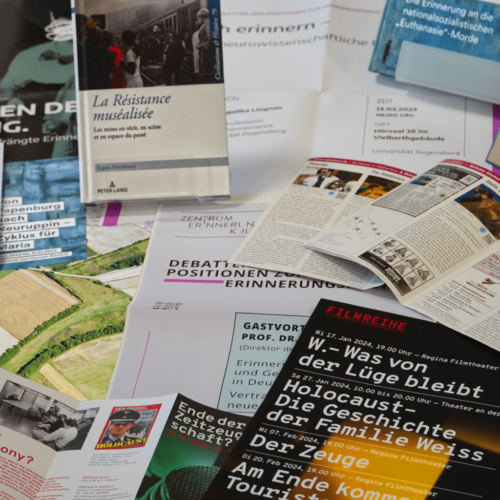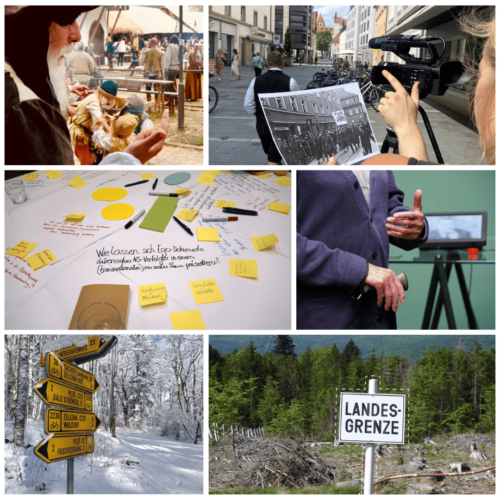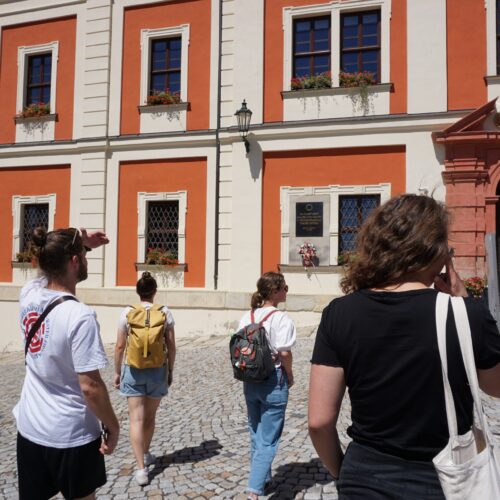The Center for Commemorative Culture (Zentrum Erinnerungskultur) is dedicated to studying commemorative practices, discourses, and the politics of history both in the present and the past. To this end, its work combines theory and practice, scholarly and social engagements, penetrating research, and intermediary formats.
The CCC focuses on the following questions:
- Which institutions and actors shape public engagements with the past and with history, both in the political and the (popular) cultural sphere? What intentions and positions determine these discourses? What instruments and strategies are applied in this context?
- What global influences, trends, patterns, and discourses are reflected in local, regional, and/or ‘glocal’ practices? What trans-epochal and trans-cultural patterns underlie commemorative practices and activities within the politics of history?
- How can phenomena relating to commemorative culture be compared in chronological perspective as well as in different local, (trans-)regional, or (inter-)national contexts? What economies and emphases can be discerned in debates relating to commemorative culture and the politics of history?
- How can the term commemorative culture and its related practices be critically historicized? What role do engagements with the colonial legacy of Western societies play in this regard?
- How has the scholarly engagement with questions and concepts relating to commemorative culture developed in terms of theme, methodology, and theory? What approaches have been discussed and applied in different disciplines?
- How do forms of process-orientated doing history, often associated with embodiment and performative approaches, influence the commemorative and historical culture?
- What role do social markers and positionings like gender, class, race, and intersectionality play in practices and representations relating to commemorative and historical culture?
- What possibilities do digital formats hold for commemorative culture? What potential is generated by virtual forms and practices, for example with regard to the “end of contemporary witnesses of National Socialism”?
- How do debates at eye-level emerge between theoreticians and practitioners of commemorative culture? What role do co-creative and collaborative approaches play in reconceptualizing established forms of knowledge? What experimental settings could serve this end?
The CCC is conceived of as a scholarly and discursive forum for the promotion of engagements with commemorative cultures past and present. As such, it is open to all manner of themes
During its preparatory phase, work at the CCC is concentrated on four aspects:
1) Commemoration of National Socialism and the Holocaust
As a result of the close cooperation between the University of Regensburg and the Flossenbürg Concentration Camp Memorial, research on and the dissemination of the commemoration of National Socialism and the Holocaust constitutes one of the key activities of the CCC. Sociopolitical and historical debates both past and present testify to the unbroken relevance of this thematic focus. Of particular importance here is the critical analysis of political discourse histories, of victim and perpetrator narratives, and of various aspects of the social engagement with National Socialism and the Holocaust. Further focal points include historical and political dissemination activities, the didactics of commemorative pedagogy, and related strategies of digitization.
2) Commemorative Cultures of Premodernity
The CCC has a focus on premodern phenomena encompassing both commemorative cultures in premodern societies and the perception of past centuries in the present. This serves to supply a long-term historical perspective to engagements with commemoration, which otherwise tend to focus to a great degree on the twentieth century, and to examine historical change and continuity in commemorative cultures. This emphasis is supported by the comprehensive scholarly expertise available in Regensburg, the city moreover offering an ideal object of analysis on the doorstep, so to speak, namely the diverse legacy of the Old Empire and the Perpetual Diet evident in the city’s topography and commemorative landscape. This allows for an investigation of issues that offer manifold insights when viewed from various disciplinary perspectives, such as Memoria and demonstrations of power, artistic imaginings of premodernity, cultural heritage, as well as tourism and marketing.
3) Regional, Transregional, and ‘Glocal’ Commemorative Cultures
Memory is often consolidated in space, places, landscapes, and regions. A focus on specific local or regional contexts allows actors and events to be approached close-up. At the same time, regional experiences must always be located in national and transnational developments and contextualized through comparative perspectives.
A particular emphasis here lies on border regions. These constitute both spatial orders and constructions, moreover connecting to political and ideological programs. They are also transnational and/or transregional zones of entanglement that produce their own commemorative cultures. The memories associated with the drawing, consolidation, or disappearance of borders are as important in this context as the question of whether borders serve to divide commemorative communities from each other or whether they also hold a unifying function as spaces of mutual experience.
4) Concepts and Analytical Approaches in Research on Commemorative Culture: Recent Trends and Debates
This focal point is dedicated to a fundamental engagement with “commemoration.” Of particular interest here are individual and collective conditions and contingencies as well as the political, judicial, economic, and artistic forms, functions, and consequences of commemoration. These are approached in different formats and from a decisively interdisciplinary perspective, incorporating not only cultural studies disciplines and literary studies, but also psychology/neuroscience and jurisprudence. The aim is not only to comprehend commemorative culture from a cultural studies perspective, but also to address memory as a fundamental condition of human existence.



